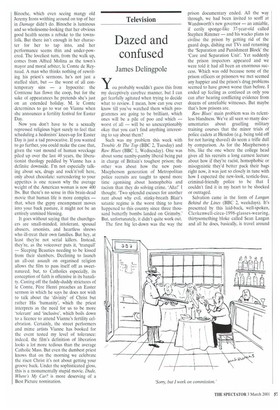Television
Dazed and confused
James Delingpole
You probably wouldn't guess this from my deceptively carefree manner, but I can get fearfully agitated when trying to decide what to review. I mean, how can you ever know till you've watched them which programmes are going to be brilliant, which ones will be a pile of poo and which — worst of all — will be so unexceptionably okay that you can't find anything interesting to say about them?
Such was my problem this week with Trouble At The Top (BBC 2, Tuesday) and Raw Blues (BBC 1, Wednesday). One was about some namby-pamby liberal being put in charge of Britain's toughest prison; the other was about how the new postMacpherson generation of Metropolitan police recruits are taught to spend more time agonising about homophobia and racism than they do solving crime. 'Aha!' I thought. `Two splendid excuses for another rant about why evil, stinky-breath Blair's satanic regime is the worst thing to have happened to this country since three thousand butterfly bombs landed on Grimsby.' But, unfortunately, it didn't quite work out.
The first big let-down was the way the prison documentary ended. All the way through, we had been invited to scoff at Wandsworth's new governor — an amiable, if eerily sponge-like 37-year-old called Stephen Rimmer — and his wacko plans to civilise the prison by getting rid of the guard dogs, dishing out TVs and renaming the 'Separation and Punishment Block' the 'Care and Separation Unit'. Yet suddenly the prison inspectors appeared and we were told it had all been an enormous success. Which was odd because none of the prison officers or prisoners we met seemed any happier and the prison's drug problems seemed to have grown worse than before. I ended up feeling as confused as only you can after hearing conflicting evidence from dozens of unreliable witnesses. But maybe that's how prisons are.
Raw Blues' main problem was its relentless blandness. We've all seen so many documentaries about gruelling military training courses that the minor trials of police cadets at Hendon (e.g. being told off for not having shaved) do seem a trifle dull by comparison. As for the Macpherson-y bits, like the one where the college head gives all his recruits a long earnest lecture about how if they're racist, homophobic or misogynistic they'd better pack their bags right now, it was just so closely in tune with how I expected the new-look, testicle-free, criminal-friendly police to be that I couldn't find it in my heart to be shocked or outraged.
Salvation came in the form of Langan Behind the Lines (BBC 2, weekdays). It's presented by this laid-back, well-spoken, Clerkenw-ell-circa-1998-glasses-wearing, thirtysomething bloke called Sean Langan and all he does, basically, is travel around
slightly dodgy places like Afghanistan, Iraq, Iran and the Gaza Strip, ostensibly to find out more about the modern face of Islam, but really, you suspect, to get a cool, 'what I did in my year off-style road trip funded by the BBC.
As you will perhaps have inferred from my cynical gloss, I was all ready to hate this guy and his programme. I mean why him not me? But Sean Langan is so palpably not a tosser that you're soon rooting for him all the way. Even though he's quite plucky (e.g. filming secretly under the noses of the Taliban) there's none of that 'ooh, look at me, I'm so brave and unshaven and sexy' false modesty you get from your Benedict Aliens or your Michael Woods. He's just a fairly ordinary bloke doing exactly what most of us would do if confronted with a minefield (get scared), a burned-out Russian helicopter (sit in it) or the stadium where the Taliban execute their victims (half hope there's an execution on because it will make a better story; half hope there's not because it will all be rather grisly).
I can just imagine hardened TV foreign correspondents of the old school watching Langan's exploits and thinking: 'What an amateur! All this trivial detail about where he stayed, what he had for breakfast, how he chatted up the Taliban. But where's the story?' But I've rarely seen a programme which better captured how it really feels to be a Western traveller in the Islamic world: waiting nervously for the capricious decisions of tyrannical bureaucrats; vowing eternal brotherhood over cigarettes and endless cups of tea; saying inshallah' at every opportunity.
Also, in his rambling way, I reckon Langan gave us a far clearer picture of contemporary Afghanistan than we might have got from some hard-hitting, grown-up documentary (that we probably wouldn't have watched anyway because it would have sounded too worthy) stamped Life Under The Taliban. Perhaps I'm a bit biased here, but I think it all goes to show that editors should be much less squeamish about commissioning journalists who use 'I' a lot because actually they're often far more interesting than people who pretend to be objective. Talking of which, I notice to my horror that I've hardly written about myself at all these last few columns. It shall be remedied at the nearest opportunity.













































































 Previous page
Previous page